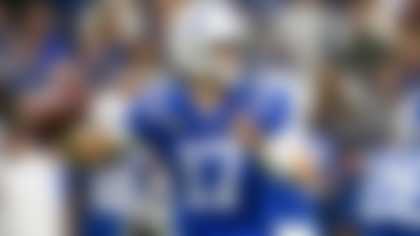There were meetings between the NFL Players Association and NFL management in the final years of NFLPA executive director Gene Upshaw's 25-year rule when Upshaw would turn to Troy Vincent and say, "You sit next to (NFL Commissioner) Roger (Goodell) -- you'll have to do that plenty one day."
And in 2007, when NFL players began demanding from Upshaw that a succession plan for his role be created, Upshaw's response to them was this: "The leadership is already in the room."
Upshaw was talking about Vincent.
Over the final year of his reign before he died of pancreatic cancer in August 2008, things changed between Upshaw and Vincent. Upshaw believed Vincent was the genesis of a push to force him out. Upshaw lost his trust in Vincent.
What Upshaw failed to see was there was a full-throttle conviction among his players that a succession plan must be created to avoid the type of rancor, messiness and mockery that has followed in the NFLPA's quest to find a new leader.
And really, Upshaw's original thought rings true much more than his latter one.
When NFL players gather this weekend in Maui to select their new chief, the leadership is already in the room. It should be Troy Vincent. It has to be Troy Vincent.
In attorney David Cornwell, the players know they would have an intelligent man who could adeptly tackle Goodell and the league on all fronts. In Trace Armstrong, they know they would have a former NFL player, a leader of long-term NFLPA service who has led efforts on player safety. In attorney DeMaurice Smith, they would present an accomplished litigator in a variety of worldwide corporate issues.
The NFL game, however, is first and foremost a human game. That is in the locker room and in the boardroom. The next NFLPA leader must be conciliator as much as raging bull, a mentoring source of sorts for the oftentimes fatherless NFL player, a person who can build bridges rather than only dump explosives and someone who can factor these economic times in tangible terms in building a fair and comprehensive new collective bargaining agreement that still rewards its players.
Someone who has the relationships in this group and in this league to ensure football is played in 2011.
That would be Troy Vincent.
No doubt, there has been a huge vacuum left since Upshaw's death, and I have heard the criticism about the length of time in finding a replacement and the fallout. Really, for a position so important and so desirable, this is somewhat the norm. The NFL knows this.
When Pete Rozelle stepped to the podium in Palm Desert, Calif., on March 22, 1989, and shockingly announced his retirement after 29 years of leadership, it took seven months to find his replacement, Paul Tagliabue. In the interim, a small group of veteran owners who tried to make then-Saints executive Jim Finks the next commissioner were overruled by a group of "new-school" owners, and an old guard/new guard owner faction developed in the league that was gritty and testy. It was far from a harmonious process. It took six months for the league to name Goodell as Tagliabue's replacement.
It will have taken the NFLPA seven months to replace Upshaw.
Those timelines are similar.
Various sources throughout the NFL remember their disjointed nature among ownership in the last collective bargaining agreement and believe the players used that to their advantage. Now, with the tables apparently turned for the NFLPA, the owners know they have the same chance. Most of them want what, in their view, would be a fairer deal, one that reduces the players receiving nearly 60 percent of revenues. They want players to factor in today's rugged economic times. They want a player rather than a lawyer. They want a person who understands the bigger picture and understands it takes two to tango. They want someone who will see the whole and not make mockery of the negotiations for a new labor deal.
Someone who can help guide both parties to playing football in 2011, when the current labor deal expires, and beyond.
They fear that NFL players, understanding that view, might choose the opposite as a leader. But really, the NFL player of today is more sophisticated than that. Sure, there are those who are not concerned with off-the-field issues, only a paycheck, and those who would only chose the opposite of the league view. But most players want a new deal and more of them than ever read their constitution, understand their by-laws, seek information and are engaged and involved. That is one of the messages they clearly gave to Upshaw during the final year of his leadership: We do not work for you, you work for us.
His death, without a succession plan in place, left a wide open, ugly fracas for power. It has left a feeling of embarrassment and uneasiness -- a disgust for the mockery of the process and mudslinging, and that feeling runs painfully deep throughout the NFLPA offices and among players. Vincent took the core of the shots, largely because of his longtime predisposed position as the favorite, and some of it because of his Upshaw fallout. Vincent's business interests have been questioned, he was linked to a congressional inquiry on the NFLPA's selection process, and he was accused of e-mailing one of his business partners confidential data about player agents.
Apparently, none of it stuck.
Because Vincent is a man of character and a man of the players. His passion for their lot is genuine. His ability to reach across the aisle among his players and in the league is sturdy. His knowledge about NFLPA affairs is beyond repute.
I believe the players will make him their new leader.
When they gather in Maui, the leadership is already in the room.



